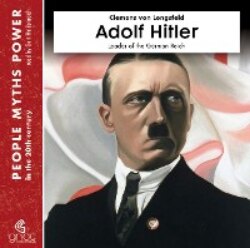Читать книгу Adolf Hitler - Clemens von Lengsfeld - Страница 11
На сайте Литреса книга снята с продажи.
ОглавлениеHogs of war and base wallahs
In actual fact the assault on the Flanders village was the only action at the Front in which Hitler took part. After that began his deployment as a despatch rider, when he was transferred to the staff of the 16th reserve infantry regiment on 9 November 1914. His place of deployment, the base, was situated some kilometres behind the main front line. Although the staff headquarters located there were hit now and then by artillery shells, this was however nothing in comparison to the continual danger of death, in which the so-called hogs of war found themselves. They were under continual fire from the enemy’s machine guns. His deployment as a messenger greatly suited his nature as an eccentric loner: safe amongst comrades and yet alone. Corporal Adolf Hitler, to which he was soon promoted, gave the impression of being a little self-important, but harmlessly so, and slightly mad to the other soldiers. His comrades made out with a wink that his head lice had clouded his mind and regarded him as a windbag and a laughable big mouth. For even then he used to deliver convoluted speeches, taking his information from reading the little Reclam books.29 His speeches spoke of victory and changes to the structure of society and of the establishing of a free people’s state. In his writings he undertook propagandistic embellishment: “I am now working for the Staff Headquarters as a battle dispatch runner. With regard to the dirt, it’s somewhat better there but in turn more dangerous. In Wytschaete alone, on the day of the first assault 3 men, out of the 8 of us, were shot and killed, and one was seriously wounded. We four survivors and the wounded man have now been decorated.”30 Hitler meant the Iron Cross 2nd class, which was awarded to him on 2 December 1914. He was to receive the Iron Cross 1st class for bravery in the face of the enemy and personal services four years later, on 4 August 1918, at the suggestion of the Jewish adjutant of the regiment, Hugo Gutmann.
However, Corporal Adolf Hitler, to whom his rank stuck long afterwards in scorn even during his political ascent, was not one of the ones at the very front, who risked their lives every day, every hour and every minute and who looked directly down the rifle barrels of the enemy. Sometimes the no man’s land between one’s own trench and that of the enemy only measured twenty-five metres.
A messenger dog brings the troops news during a gas attack. Western Front 1917.
The battles on the Western Front, in France and Flanders, were the ones which, above all, were given the designation materiel battles due to their brutality and high losses of men, animals and equipment. In these mass armies, which were propelled against each other, soldiers with no, or hardly any, military experience were deployed in the main. In the death zones between the trenches the numbers of injured, maimed and dead rose into the hundreds of thousands. The deeply and densely structured system of positions was an impenetrable labyrinth of multiple trenches secured with barbed wire. Whole forests had been chopped down in order to fortify the trenches. The trenches were the most significant element of this warfare and so became a place of anxiety and waiting, prayer and hope. In between was the empty and desolate battlefield. The days of the ordinary soldiers were as comfortless as their surroundings since these days were marked by the endless waiting and boredom, the repetitive activities always the same, tiredness and exhaustion.
In the end, one million men fell on the Somme, the battle with the most losses in the First World War.
Hitler (cross) as a soldier in the 2nd Bavarian Reserve Infantry Regiment No. 16 during the First World War.
In addition to the two iron crosses, Hitler received further awards over the course of his military career: the military merit cross 3rd class with swords, the regimental diploma for outstanding bravery, the medal for the wounded and service medal 3rd class31. In view of this fact the question must be asked as to why he only made it to corporal. There are numerous explanations to be found for this in historical research, some of which contradict each other. Thus those in the chain of command above him considered the future “Führer” unsuited to leadership tasks! Others in turn maintained that he himself had refused promotion as he was happy with his orderly and dispatch tasking. It is today still unexplained whether it was his inability or lack of ambition that was responsible for a lack of promotion. His later conduct as Supreme Commander of the Wehrmacht does however reveal him to be a pedant who, despite his tasking as a general and strategist, wanted to know and hear everything down to the last detail. In doing this he was poor at delegating and unable to trust the experts. He therefore believed he had to decide everything on his own. In the future this conduct would lead to erroneous decisions with catastrophic consequences.
